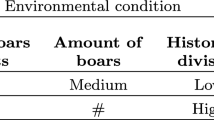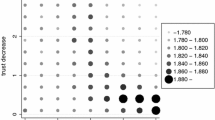Abstract
It has been extensively demonstrated that the trust between venture capitalists and entrepreneurs plays an important role in improving the success rate of entrepreneurship. However, little research has been performed concerning the dynamic nature of the trust between venture capitalists and entrepreneurs. Therefore, we attempt to reveal the motivations and process of trust between VCs and entrepreneurs from the perspective of dynamics. First, the theoretical model of dynamic trust was proposed. Second, reinforcement learning was introduced to design the multi-stage game model of dynamic trust, and the algorithm was illustrated. Reinforcement learning theory can reveal the reasons for dynamic changes in trust from a psychological perspective. Finally, the action strategies of venture capitalists and entrepreneurs were simulated. We observe that the dynamic characteristics of trust between venture capitalists and entrepreneurs are determined by entrepreneurs’ efforts. Venture capitalists can prevent investment risks and maintain trust stability when fewer funds are invested in the early stage and when more funds are invested in the later stage. Since the dynamic process of trust is also the process of learning about the other, the dynamic process of trust is non-linear, and the relationship is adaptive.







Similar content being viewed by others
References
Timmons, J.A., Bygrave, W.D.: Venture capital’s role in financing innovation for economic growth. J. Bus. Ventur. 1, 161–176 (1986)
Starrglass, D.: Trust in transactional and relationship marketing: implications in a post-crsis world. Manag. Glob Transit. 9(2), 111–128 (2011)
Luhmann, N.: Familiarity, Confidence, Trust: Probems and Alternatives in Making and Breaking Cooperative Relation, pp. 94–107. Basil Blackwell, Oxford (1988)
Pavlou, P.A., Gefen, D.: Building effective online marketplace with institution-based trust. Inf. Syst. Res. 15(1), 37–59 (2004)
Song, J., Zahedi, F.: Trust in health infomediaries. Decis. Support Syst. 43, 390–407 (2007)
Hagen, J.M., Choe, S.: Trust in Japanese interfirm relations: institutional sanctions matter. Acad. Manag. Rev. 23(3), 589–600 (1998)
Kwon, S.W., Arenius, P.: Nations of entrepreneurs: a social capital perspective. J. Bus. Ventur. 25(3), 315–330 (2010)
Maxwell, A.L., Jeffrey, S.A., Lévesque, M.: Business angel early stage decision making. J. Bus. Ventur. 26(2), 212–225 (2011)
Mayer, J.H., Davis, F.D.: Schoorman: an intergrive model of organizational trust. Acad. Manag. Rev. 20(3), 709–734 (1995)
Poon, J.M.: Effects of benevolence, integrity, and ability on trust-in-supervisor. Empl. Relations 35(4), 396–407 (2013)
Chen, C., Ye, Y.: A case study of the asymmetry of trust among venture capitalists and entrepreneurs. Chin. Ind. Econ. 1, 147–157 (2010)
Sorenson, O., StuarT, T.E.: Syndication networks and the spatial distribution of venture capital investments. Am. J. Sociol. 106, 1546–1588 (2001)
Welter, F., Smallbone, D.: Exploring the role of trust in entrepreneurial activity. Entrepr. Theory Pract. 30(4), 465–475 (2006)
Ye, Y., Jiang, Y.F.: A cross case study of the impact of trust on new ventures performance in venture capital institutions. Manag. World 10, 152–163 (2009)
Gefen, E., Karahanna, D.W., Straub, D.: Trust and TAM in online shopping: an integrated model. MIS Q. 27(1), 51–90 (2003)
Gifford, S.: Limited attention and the role of the venture capitalist. J. Bus. Ventur. 12(6), 459–482 (1997)
Bergemann, D., Hege, U.: Venture capital financing, moral hazard, and learning. J. Bank. Finance 22, 703–735 (1998)
Wong, P.K., Ho, Y.P.: Characteristics and determinants of informal investment In Singapore. Venture Cap. 9(143), 43–70 (2007)
Sudek, R.: Angel investment criteria. J. Small Bus. Strategy 17(2), 89–103 (2006)
Rescorla, R.A., Wagner, A.R.: A theory of Pavolovian conditioning: variations in the effectiveness of reinforcement and non-reinforcement. Class. Cond. II 2, 64–99 (1972)
Watkin, C.J.: Q-learning. Mach. Learn. 8, 279–292 (1992)
Schwartz, A.: A reinforcement learning method for maximizing undiscounted rewards. In: Proceedings software Tenth International Conference on Machine Learning (1993)
Sutton, R.S., Barto, A.G.: Reinforcement learning: an introduction. MIT Press, Cambridge (1998)
Wardle, M.C., Fitzgerald, D.A., Angstadt, M., et al.: The caudate signals bad reputation during trust decisions. PLoS ONE 8(6), e68884 (2013)
Singh, P., Norvig, D., Cohn, D.: Agents and reinforcement learning. Dr. Dobb’s J. Softw. Tools Prof. Program. 22(3), 3 (1997)
Ptadepalli, P., Givan, R., Driessens, K.: Relational reinforcement learning: an overview. In: Proceedings of the 1CML Workshop on Relational Reinforcement Learning Barlff (2004)
Klabunde, A.: How much should an investor trust the start-up entrepreneur? A network model. J. Econ. Interact Coord. 11, 293–312 (2016)
Chang, L.J., Doll, B.B., van‘t Wout, M., et al.: Seeing is believing: trustworthinessas a dynamic belief. Cogn. Psychol. 61, 87–105 (2010)
Chang, L.J., Yarkoni, T., Khaw, M.W., Sanfey, A.G.: Decoding the role of the insula in human cognition: functional parcellation and large-scale reverse inference. Cereb. Cortex 23(3), 739 (2013)
Lewicki, R.J., Bunker, B.B.: Developing and Maintaining Trust in Working Relationships, Trust in Organizations: Frontiers of Theory and Research. Sage, Thousand Oaks (1996)
Kramer, R.M.: Trust and distrust in organizations: emerging perspectives, enduring questions. Annu. Rev. Psychol. 50, 569–598 (1999)
Panteli, N., Sockalingam, S.: Trust and conflict within virtual inter-organizationalalliances: a framework for facilitating knowledge sharing. Decis. Support Syst. 39, 599–617 (2005)
Nielsen, B.B.: Multilevel issues in strategic alliance research. Emerging Percpectives. Researching Strategic Alliances: Emerging Issues, pp. 1–26 (2010)
Berg, J., Dickhaut, J., McCabe, K.: Trust, reciprocity, and social history. Games Econ. Behav. 10, 122–142 (1995)
Ratnasingam, P.: Trust in inter-organizational exchanges: a case study in business to business electronic commerce. Decis. Support Syst. 39, 525–544 (2005)
Elitzur, R., Gavious, A.: A multi-period game theoretic model of venture capitalists and entrepreneurs. Eur. J. Oper. Res. 144, 440–453 (2003)
Sapienza, H.J., Gupta, A.K.: Impact of agency risks and task uncertainty on venture capitalist-CEO interaction. Acad. Manag. J. 37(6), 1618–1632 (1994)
Author information
Authors and Affiliations
Corresponding author
Rights and permissions
About this article
Cite this article
Haiyan, L. Dynamic trust game model between venture capitalists and entrepreneurs based on reinforcement learning theory. Cluster Comput 22 (Suppl 3), 5893–5904 (2019). https://doi.org/10.1007/s10586-017-1666-x
Received:
Revised:
Accepted:
Published:
Issue Date:
DOI: https://doi.org/10.1007/s10586-017-1666-x




